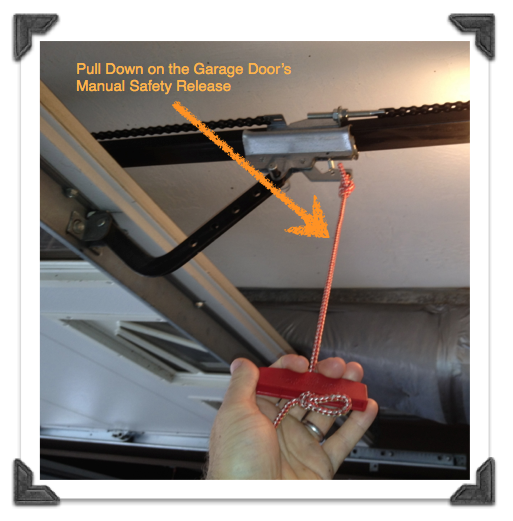How to Release and Reset the Emergency Cord on a Garage Door
January 20, 2016

Every once in awhile, you might find yourself with a garage door that you need to manually move due to a failure of the garage door parts, motor, or power supply. Sometimes your power has gone out, sometimes there might be an actual emergency, other times you might just need to check to see if your garage door is broken. At Precision Door of Boise, we want to make sure that whatever your reason for pulling the emergency cord on your garage door, you are correctly disengaging your garage door opener as well as have the ability to later re-engage that garage door. Below are some simple instructions so you know exactly how to quickly reset your garage door.
1. Door Must Be in Down Position
Before you disengage your garage door opener from your garage door, make sure that the door is in the down position. Attempting to disengage your door in the up position is extremely dangerous. This is due to the fact that if the spring on your garage door is broken, it could cause the full weight of the garage door to come crashing down. This could cause damage to anything under the garage door, including yourself, as well as break the garage door itself.
If your garage door is stuck in the open position, please contact Precision Door of Boise immediately, so we can fix your door before serious damage occurs. We have 24/7 emergency services, just for situations as hazardous as this.
2. Pull the Emergency Release Cord
The emergency release cord is the red rope that hangs from the door trolley. The trolley is connected to the door and moves with the door as it opens and closes. Through the attachment point, the trolley is also connected to the opener carriage. The opener carriage is the automated mechanism that moves the door along the door rail/track. The emergency release cord disconnects the trolley through attachment point from the opener carriage so that the door can slide along the track, without the automated carriage. This allows you to manually open and close the garage door.
3. Manually Move the Garage Door and Return to Down Position
Step 2 will allow you to freely move the garage door open and close. Once you are done maneuvering your garage door and are ready to re-engage the automatic door opener, please return the garage door back to the down position.
4. Pull the Emergency Release Cord Toward the Door
In relation to the emergency release cord, the trolley has two positions: connected and disconnected. These two positions alter the location of the spring lever on the trolley. When the spring lever is in the disconnected position, the spring lever is extended. This position is achieved by pulling the release cord down and away from the door, towards the motor. When the spring lever is in the connected position - the position required to re-engage the garage door opener carriage - the spring lever is compressed. To achieve the connected position, pull the emergency release cord down and toward the door, away from the motor.
5. Re-connect the Trolley to the Opener Carriage
From here there are two ways to reconnect the trolley to the opener carriage. You can do this manually after the emergency cord spring lever has been put in the connected position. Simply slide the door along the track until the attachment point is re-engaged. Or, you can hit your garage door opener remote, and the opener carriage will reconnect with the trolley through the attachment point automatically. In both instances, you will hear a loud click as the attachment point reconnects. At this point, the emergency release cord on your garage door should be reset and ready to be used in the case that you need to move your garage door manually.
For a demonstration of this process, please watch our YouTube video, "How To Open Your Garage Door Manually." If you have any problems or if your garage door needs repair, please contact Precision Door of Boise.








